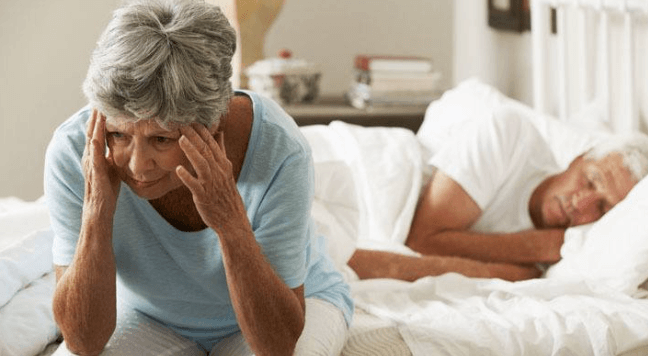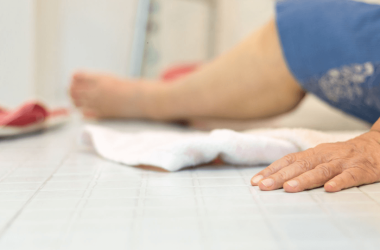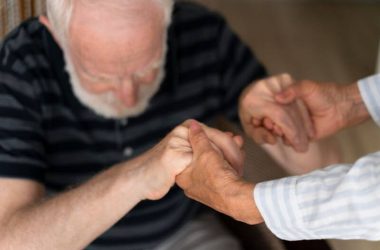It is only when you check that you will learn what it is that causes him to struggle to get a restful night’s sleep and find a solution. According to a poll conducted on healthy aging, almost half of seniors in the U.S. reported disturbed sleep.
What is worse is that most seniors believe insomnia or staying asleep is part of the aging process, so don’t even talk about it or give it the importance it deserves.
What Kind Of Problems Keep Seniors Awake At Night?
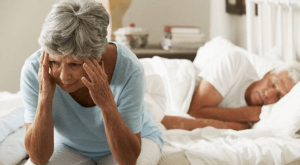
There are many common points that seniors face in sleeping that keep them awake through the night. Here are some of them:
Frequent Urination:
Most seniors complain about needing to get up several times in the middle of the night to go to urinate. This can be due to a variety of reasons, one of them being poor bladder/urethra muscle control.
With aging, muscles, and nerves, too, get affected and the senior may think it is not a problem. However, there can be several reasons for this, apart from poor control, some of them being:
- Urinary tract infections : If there is an infection, your senior will tell he have some burning sensation during urination. In this case, consult your doctor.
- Neurological conditions – If your elderly has Dementia, Parkinson’s, multiple Sclerosis, or something else that may be the cause of frequent bathroom trips at night.
- Diabetes that is not kept in check – If your elderly have diabete. You should keep a check on his medicine and food intake for the right balance, because it can result in disturbed sleep due to getting up to urinate at night. It is important that diabetes be monitored regularly, medicine or insulin doses not missed and the food intake is not over or under.
- Medications that irritate the bladder : If your senior is on medication, consult his doctor to see if it could be disrupting his sleep.
✔ Nighttime waking up to use the bathroom can be due to many medical factors, doctors can help in this case.
✔ As long as there is no medical reason for frequent urination, you should consider using adult diapers that will help with getting undisturbed sleep during the night.
Other Health Issues:
Apart from frequent night waking due to frequent urination, the senior may have other conditions that impact sleep quality. These include:
Restless legs syndrome:
Many seniors report suffering from RLS restless legs syndrome, more so, if they are bed-ridden. This can also make them get up.
Respiratory Issues:
If your senior has a chronic cough or cold or is asthmatic, it could be one reason that he is sleeping fitfully. The right medications can help with this and many cough and cold medications can even help with sleep.
Sleep apnea:
If your senior suffers from this, he may wake up often during the night. This is a disorder that can be diagnosed by a sleep doctor and treated, usually by using a CPAP machine or other devices or medications, depending on the severity. New methods to treat sleep apnea are already being trialed.
Chronic pain:
If your senior has a health issue that results in chronic pain, then this may add to disturbed sleep. If the elderly parent is taking many medicines to help with chronic pain, but still getting up frequently, then changing medicines may help with the pain and also result in more restful sleep. Fragmented and disturbed sleep contributes to pain, so it is important to get this issue redressed.
Stress and anxiety:
While you may think that seniors usually have nothing to worry about, since they have often finished their working life, they may still experience stress and anxiety regarding their own health and wealth, relationships, and other issues. If stress and anxiety are keeping the senior awake, then perhaps talking to a mental health specialist would be in order.
TakeAway :
✔ Again, medical reasons for sleep disturbances in seniors can be numerous and varied, from conditions like urinary tract infections and diabetes to neurological disorders and side effects of medications.
✔ Any doubt about this should lead to consulting healthcare professionals to accurately diagnose and treat the underlying medical causes of sleep issues
Non Health Issues:
Environmental problems
Music or the television on in another part of the house, noise from traffic or neighbors, excessive light (coming in through doors or windows), or uncomfortable temperatures can disturb a senior’s sleep.
✔ Check the source of possible noise: in very quiet surroundings, any sound can be amplified. You might also have a noisy clock in the room and every possible ticking sound …
✔ Measure the room temperature and make sure it is comfortable ( not too hot or too cold ).
✔ Verify that the bed and pillows are suitable, and that the bed, including the mattress, is comfortable.
Nightmares
Some seniors report nightmares that disturb their sleep. While most people have nightmares occasionally, a vivid nightmare can be enough to keep the senior awake and stressing over it.
✔ Ensure that the senior does not watch scary movies or read horror books at bedtime
✔ If your senior is taking some medicines, more so in the later part of the day, check with the doctor if this could be a side effect.
Excessive fluid intake
Increased fluid intake (especially coffee, beverages, and alcohol) can lead to bladder irritation and cause the senior to get up from bed to pee.
Nighttime hunger
If the senior is eating early, it may well happen that he feels hungry in the middle of the night and therefore wakes up. If that is the case with your senior, then it is best to check that he is eating enough at dinner time. And if that is not enough, then perhaps keeping some cookies or dry snacks for him to eat at the bedside table may be enough to assuage hunger pangs.
✔ Adapat the eating time of your elderly or put some dry snacks at their bedside to help manage hunger during the night.
✔ Ideally, remove eating habits during the night.
What Else you can do to help your Senior Sleep Better?
There is a lot that you can do apart from what noted, the senior should practice good sleep hygiene that will help in better sleep. Here are some things that can be done:
✔ Make him have a fixed time for meals and a fixed time for going to bed. It helps a lot in getting good sleep. It is recommended to eat before 7 PM and aim to go to bed at the same time each night to support your body’s natural sleep-wake cycle.
✔ Make a pre-sleep routine : changing into night clothes, brushing teeth, and brushing out the hair also reinforce the routine.
✔ Don’t let your elderly sleep after 3 p.m. It may disturb his bedtime at night : No nap after 3 p.m !
✔ White noise : some low humming or white noise can help drown out other sounds and, this is soothing !
✔ Magnesium & Potassium : Magneisum and potassium can help sleep better as these minerals aid in relaxing muscles.
✔ Sunshine : ensure that the senior spends some time outdoors during the day. If he is physically active as well, this can help with sleep.
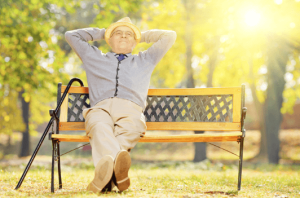
✔ Avoid caffeine ( before 6 hours ) and nicotine as well.
✔ Exercise : doing light exercise during the day is beneficial in many ways and the routine can be broken up into smaller fragments if the senior is not able to manage doing everything at one time.
✔ Restricting screen time at night : whether it is phone or television, ensures that there is no screen excitement an hour or so before bedtime. Screens are notorious for keeping people awake.
✔ Bath : a warm bath or shower can also be a relaxing ritual that reduces stress and anxiety and it can lead to a restful night’s sleep.
✔ Alcohol Drink should be eliminated especially before bedtime.
Final Words
When your senior has health problems, ensure that he or she gets the medical help needed and follows the doctor’s advice. Whether the issues are medical, environmental or related to the lifestyle, you can always seek help before it snowballs into something difficult to treat.
When your senior sleeps better at night, so will you, so take advantage of these recommandations.




